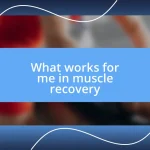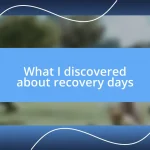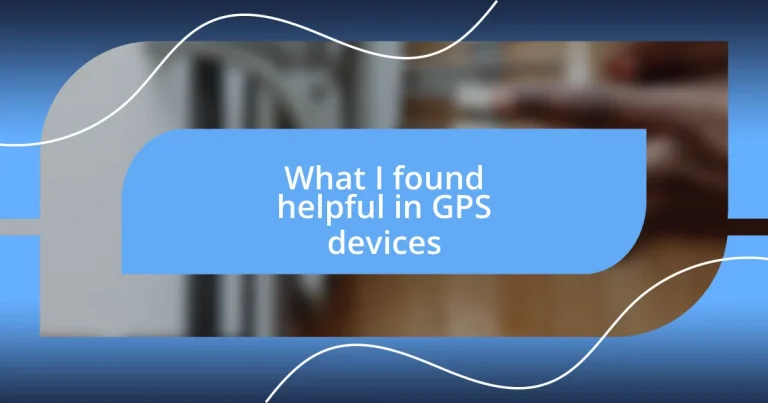Key takeaways:
- GPS devices enhance travel by providing real-time navigation, improving safety, and optimizing routes to save time and fuel.
- Accuracy in navigation is crucial to avoid delays and safety risks, as it significantly impacts route planning, safety, and fuel efficiency.
- User-friendly interfaces and advanced functionalities, such as real-time traffic updates and multi-destination planning, greatly enhance the overall navigation experience.
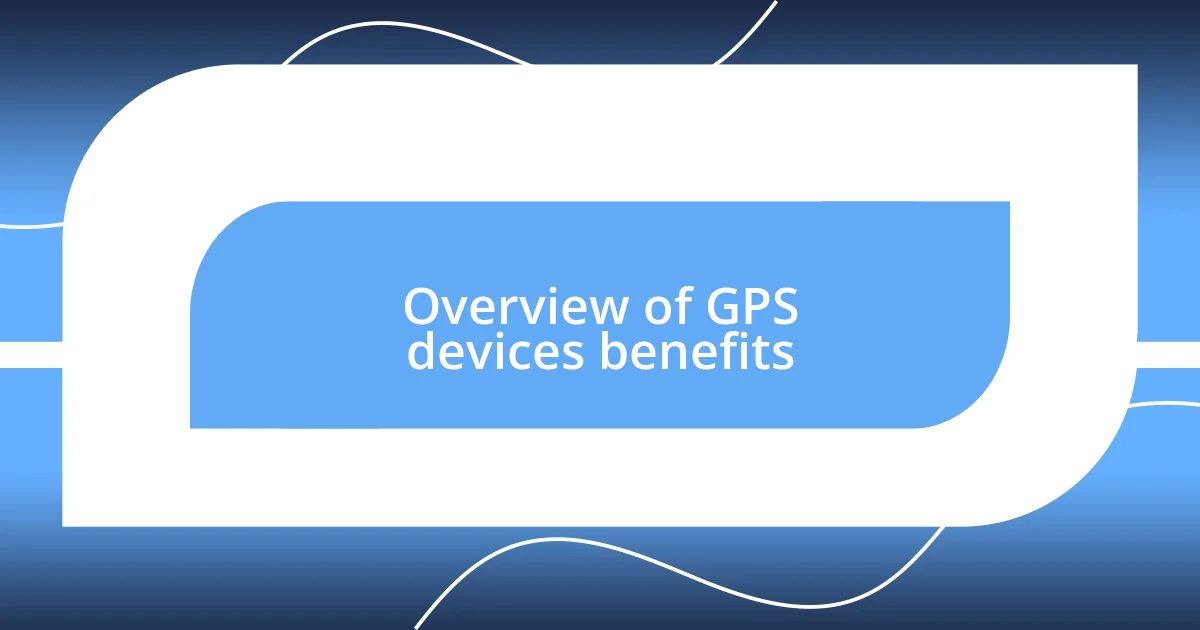
Overview of GPS devices benefits
One of the biggest benefits of GPS devices is their ability to provide real-time navigation. I remember a road trip I took, where we veered off the usual path. Instead of panicking, I simply relied on my GPS to reroute us through a scenic alternative. It turned a potentially stressful situation into an unexpected adventure. Isn’t it comforting to know that help is just a tap away?
In addition to navigation, GPS technology can enhance safety, especially when traveling in unfamiliar areas. I once was in a city where my phone app alerted me to avoid a particular route due to a traffic accident. This little feature saved me not just time, but also the potential hassle of getting stuck in a jam. Doesn’t it just give you peace of mind knowing that your GPS can keep you safe?
Moreover, GPS devices come with features that can optimize routes and save fuel. I often find myself planning weekend trips, and there’s something reassuring about knowing I can get the best route—even if it means avoiding a busy highway. Have you ever experienced the satisfaction of seeing your estimated arrival time improve simply because your GPS suggested a smarter route? It’s those little victories that make the journey enjoyable.
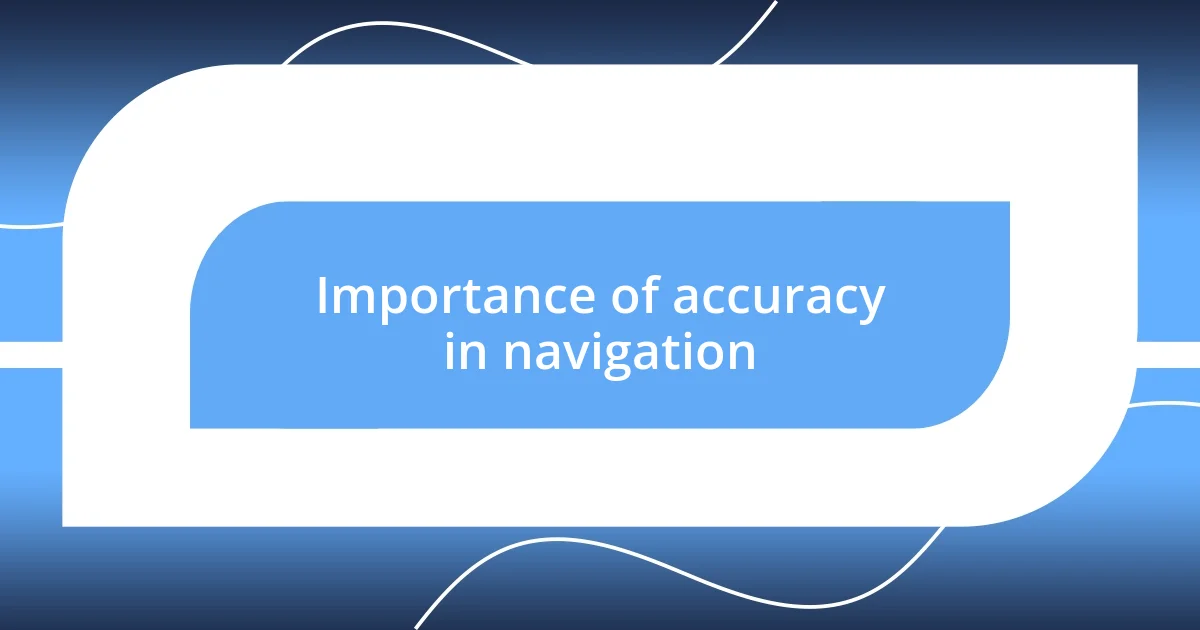
Importance of accuracy in navigation
The importance of accuracy in navigation cannot be overstated. I recall a time when my family and I were traveling to a remote camping site. The GPS indicated a shortcut through back roads. When we took it, the device led us into a maze of unmarked paths. Fortunately, we were able to find our way back after a bit of backtracking, but it highlighted just how critical accurate navigation can be, especially in unfamiliar territory. Navigational errors can lead not only to delays but also to safety risks.
Moreover, accuracy impacts fuel efficiency. On another trip, I noticed that a small detour my GPS suggested saved us time and kept our fuel consumption down. It’s fascinating how even a minor miscalculation in our route can turn into an unexpected pit stop at a gas station. When I think about how much I value my time and resources while traveling, the significance of having accurate GPS navigation becomes very clear.
Finally, consider the emotional aspect of navigating. A wrong turn in an unknown place can create anxiety. Just recently, I was in a bustling city, and my GPS gave me precise directions to a popular restaurant. The confidence in its guidance allowed me to simply enjoy the journey without worry. An accurate GPS experience transforms potential frustration into enjoyable moments where you can truly immerse yourself in your travels.
| Aspect | Impact of Accuracy |
|---|---|
| Route Planning | Ensures efficient travel, saves time |
| Safety | Reduces risk of getting lost, increases confidence |
| Fuel Efficiency | Optimizes routes, minimizes costs |
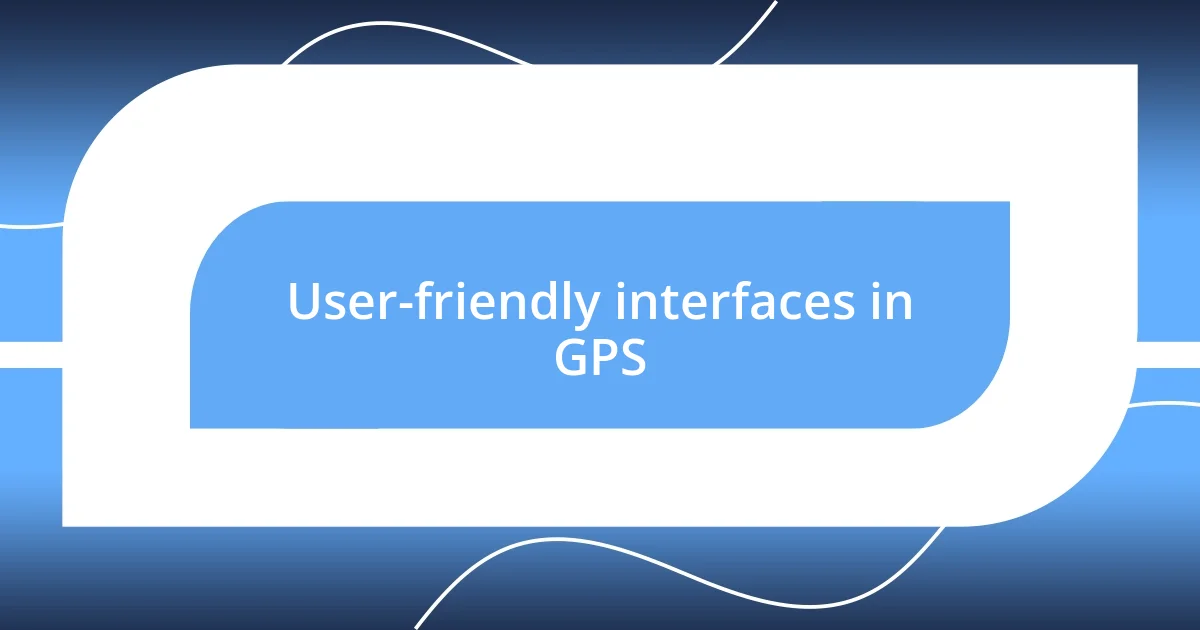
User-friendly interfaces in GPS
When I think about user-friendly interfaces in GPS devices, the first thing that comes to mind is the ease of navigation. I remember using a device where the screen displayed clear, simple icons and easy-to-read maps. This clarity allowed me to focus on the road rather than fumbling with complicated menus. I’ve found that a user-centric design makes all the difference, especially during long drives when fatigue sets in.
Here are a few key features that contribute to user-friendly interfaces in GPS devices:
- Intuitive Touchscreens – Large buttons and swipe gestures simplify interaction, allowing quick inputs while driving.
- Voice Navigation – Clear, real-time directions mean I can keep my eyes on the road instead of the screen.
- Customizable Settings – I appreciate being able to adjust preferences like voice prompts or route types to suit my needs.
- Visual Aids – Color-coded traffic alerts help me instantly assess road conditions without needing to decipher complex information.
- User Support – Direct access to help or FAQs can save a lot of time when I’m in need of assistance.
There’s something inherently satisfying about a GPS that communicates effectively. I once had a device that not only guided me but also offered friendly comments during the route, which lightened the mood on a long drive. Its warm feedback felt less robotic and more like chatting with an old friend, making travel a much more pleasant experience. Isn’t it amazing how a little personality can truly enhance functionality?
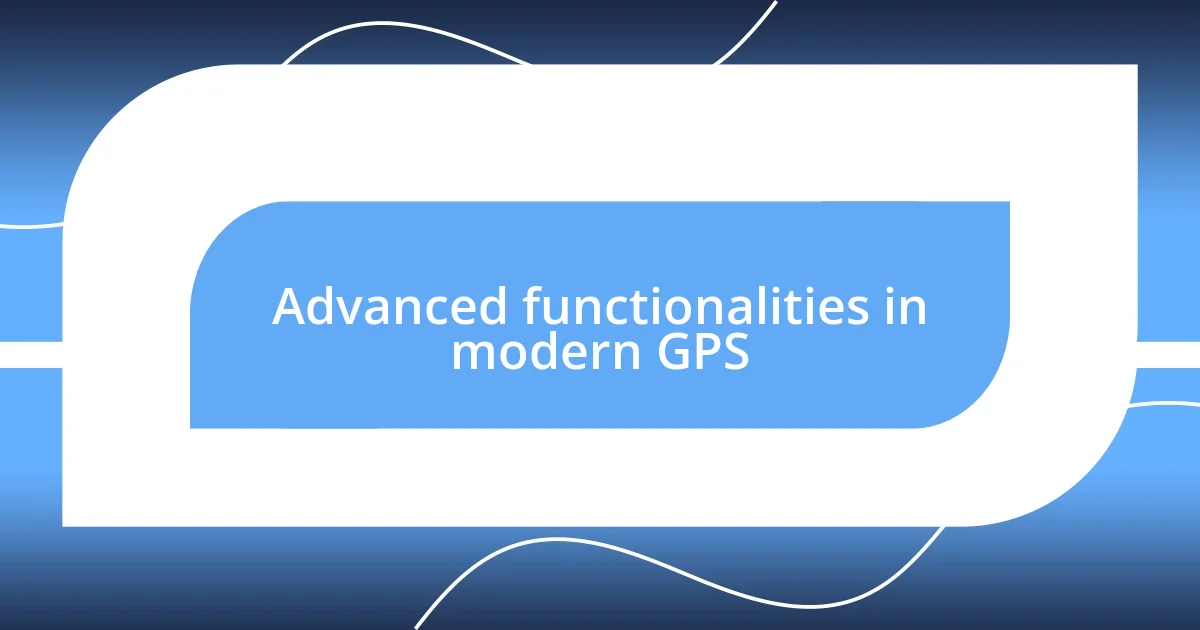
Advanced functionalities in modern GPS
Advanced GPS devices have integrated remarkable features that elevate the navigation experience. One standout functionality is real-time traffic updates. I remember one hectic Friday evening when I was heading home from work. My GPS alerted me to a major accident ahead and suggested an alternate route. This not only saved me time but also eased the frustration of being stuck in traffic. Isn’t it empowering to have a device that adapts to real-time conditions, making your journey smoother?
Another impressive feature is the ability of modern GPS systems to provide predictive analytics. These devices learn from my travel patterns and often suggest routes I might prefer based on my history. For instance, I regularly visit a certain area for weekend brunch, and my GPS now prompts me with a shortcut that bypasses the usual congestion. It’s like having a personal assistant who understands my habits and preferences. How comforting is that, knowing the technology I rely on is working to make my travels more efficient?
Finally, let’s talk about multi-destination planning. Gone are the days of manually plotting each stop on a map. The last road trip I took involved several friends and multiple stops, and my GPS calculated the optimal route for us with a few taps. Witnessing the routes seamlessly adapt as we changed our plans made the experience feel less like a chore and more like an adventure. How liberating is it to travel without the burden of logistics weighing you down? Having these advanced functionalities not only enhances travel efficiency but adds a layer of joy to the journey itself.
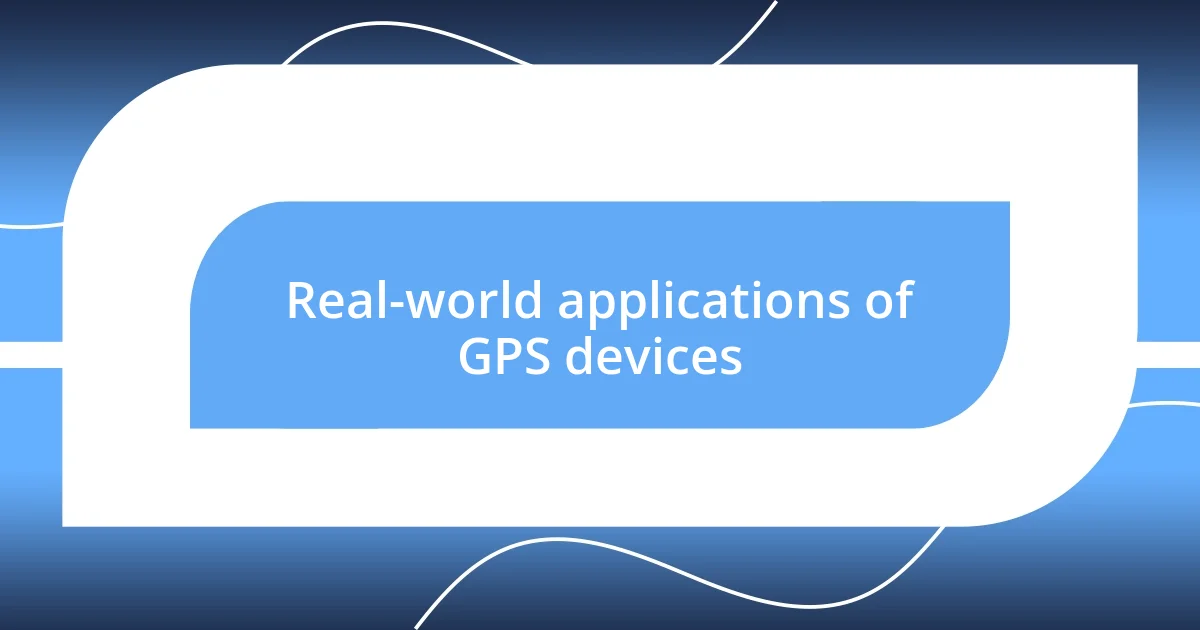
Real-world applications of GPS devices
The applications of GPS devices in everyday life are truly fascinating. For instance, I remember a hiking trip where my GPS helped me navigate through a dense forest. Without those clear trail maps, I would have felt lost, both literally and figuratively. It was such a relief to know I could find my way back to the campsite without second-guessing my path. Have you ever relied on technology to guide you through the great outdoors?
Emergency response is another critical area where GPS shines. I once volunteered with a local search-and-rescue team. We utilized GPS technology to track our positioning when searching for lost hikers. Having accurate location data was vital for both our safety and the efficiency of operations. It’s incredible how a small device can play such a significant role in saving lives. Have you ever considered how much easier it is to help others when we have reliable tools at our disposal?
Logistics and fleet management are also heavily influenced by GPS technology. I worked for a delivery service where tracking vehicles in real-time transformed the way we operated. Each time a driver updated their route, customers received immediate notifications. The satisfaction of seeing that my package was arriving on schedule was a game-changer. I realized how much trust technology can build between service providers and clients. Isn’t it remarkable how GPS can strengthen those connections in our fast-paced world?
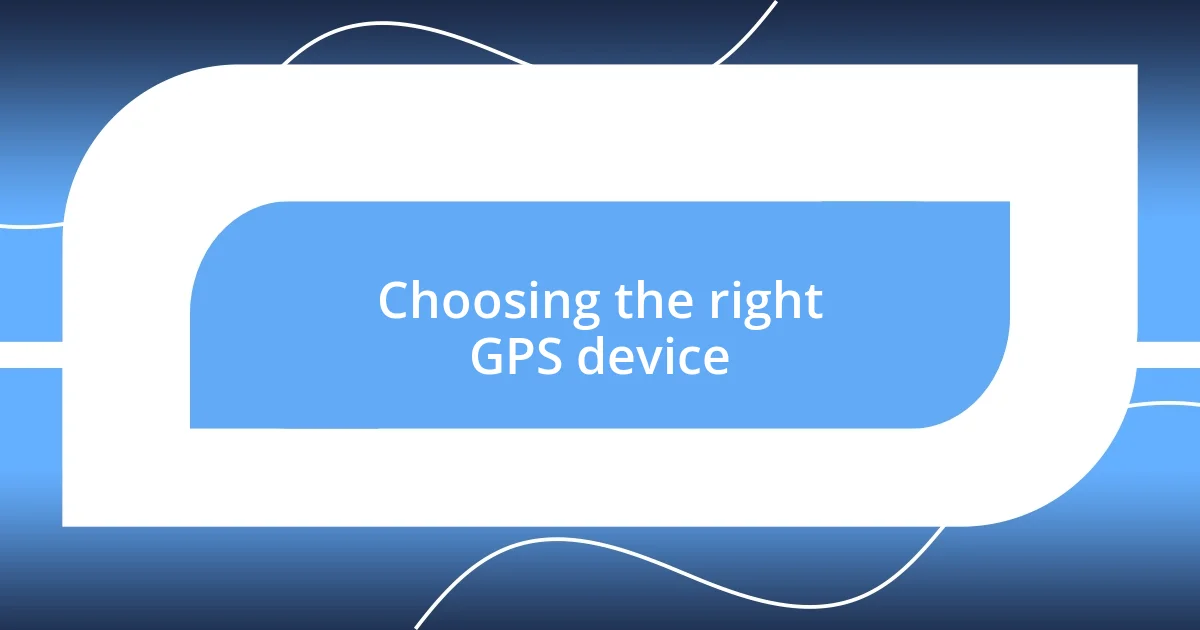
Choosing the right GPS device
Choosing the right GPS device can feel overwhelming with so many options on the market. I remember spending hours comparing features, reading user reviews, and even getting advice from friends. One helpful tip is to think about your specific needs. Are you an urban commuter, an off-road adventurer, or someone who just needs basic navigation? Understanding your own travel habits can greatly narrow down your choices.
Another aspect to consider is the usability and interface of the device. A few years back, I tried a GPS unit that seemed promising but ultimately frustrated me with a clunky menu. It took too long to input destinations, which was especially annoying when I was in a hurry. I learned that a user-friendly interface is crucial. You want something that won’t distract you while driving but rather enhance your journey.
Lastly, think about the updates and support from the manufacturer. When I invested in my GPS device, I made sure it had lifetime map updates. It’s truly nerve-wracking to drive on unfamiliar roads that may have changed since the last map was released! Having reliable updates means I can trust that my navigation is current, which adds peace of mind during my travels. Have you ever been caught off guard by an unexpected detour? It’s experiences like those that make me appreciate the value of a well-chosen GPS device.

